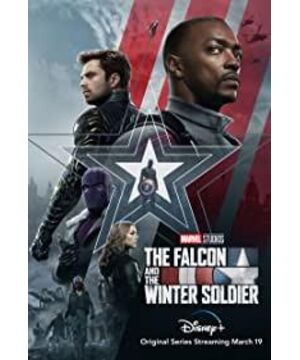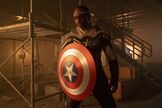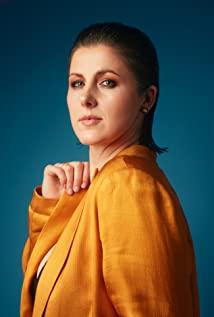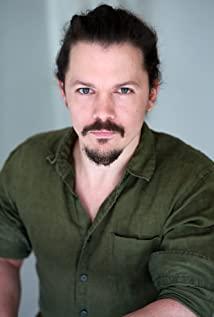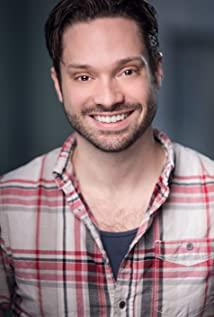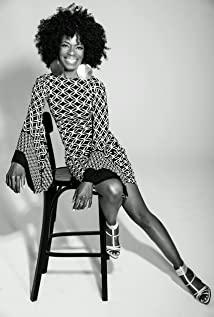"The Falcon and the Winter Soldier" is Marvel's second drama in 2021. It can also be seen as "Captain America 3.5" because at its core it's about who should inherit the mantle of "Captain America" Rogers. Here, the concept of "Captain America" Rogers is seen in the sense of homesickness. Falcon Sam inherited the concept of Rogers because they were both "nostalgic".
"The Falcon and the Winter Soldier" and "Captain America 1, 2, and 3" are similar in that there is a "home but no home" smog that pervades them. Although Rogers is known as "Captain America", he is also a person who is despised. In "Captain America 1", he was disliked because he was too weak; in "Captain America 2, 3", he was disliked because he was "disobedient". His country family wants to use him as a tool, as a weapon. As Ultron satirized him: as if there is no war, you have no value. (to the effect).
However, at least Rogers can get a praised reputation. By contrast, Isaiah Bradley, the black super-soldier in The Falcon and the Winter Soldier, is not only used as a weapon, but also undeserving of honor. Falcon Sam is the one who defends "everyone."
Falcon Sam can be qualified to inherit the title of "Captain America", not only because of the historical burden he bears, but more importantly, he can have empathy with "homeless people". "Avengers 4" defeated Thanos, and what he did was to defend the empty shell that seemed to be home. But cruel managers look as bad as enemies. This is roughly the reason for the "Flagbreaker" in "The Falcon and the Winter Soldier". Their slogan is "One World, One People"; they want to defend the feeling of home.
Falcon Sam can sympathize with or approve of Carly in "Flagbreaker", and wants to convince the latter, rather than join the ruthless administrators and eliminate the latter outright. The relationship between Sam and Carly can be compared to the relationship between Rogers and Wanda. They all share the feeling of "nostalgia". In order not to be disliked and to defend his home, Rogers voluntarily accepted the transformation of scientists; so did Wanda, and so did Carly.
Speaking of Wanda, it's time to come and miss her hometown with her fellow countryman, Baron Zemo. They are both Sokovians, the difference is that Wanda belongs to the commoners and Zemo belongs to the nobles. Nobles are masters, commoners are slaves. Their nostalgia for Sokovia can be said to be very different. Wanda lost her home, Zemo lost not only her home, but her status and more things that she couldn't get back.
In terminology, Wanda's nostalgia is "reflective" and Zemo's is "restorative." In Wanda Vision, Wanda's nostalgia is about memory, while in The Falcon and the Winter Soldier, Zemo's nostalgia is in the relics of the motherland. Before being re-arrested, Zemo came to the sculpture of his former motherland. What he saw was an object within reach, but it was also a hometown that could never be touched again. After the Meso-Soviet War and Ultron events, Sokovia was geographically erased.
Zemo's nostalgia may be more difficult to let go of in "The Falcon and the Winter Soldier". He was helpless, saying, "Sokovia was a failed state before the war." Perhaps only this "reason" can comfort him.
After all, Baron Zemo belongs to the "villain" camp and is not the protagonist, so the expression of his nostalgia will not be sufficient and direct. "The Falcon and the Winter Soldier" is of course the nostalgia of Sam the Falcon and Bucky the Winter Soldier. Bucky the Winter Soldier went from being a good soldier who defended his hometown to a hostile element who destroyed the prosperity of his hometown, to a wanderer, and finally returned to his hometown.
Simply put, what Bucky experienced was a process of being forced to leave his hometown and then "return home". Unlike others, Bucky is not discriminated against in terms of identity, but in terms of experience, he is not favored. In "The Falcon and the Winter Soldier," Bucky's problem is how to "come home" psychologically, after he's been away for too long.
It is precisely because of his appearance that Bucky has not been discriminated against, so he does not fully reflect the mentality of the "rejected". The depression he suffered psychologically was the evil he did as a "strong man". When he was in his hometown, Bucky was popular and a "good weapon" for the country; when he was controlled by an enemy, Bucky was also very obedient, and he was also a "good weapon" for the controller.
It seems that there is often such a misunderstanding that the title of "Captain America" represents "manager" or authority. Maybe in the comics, but not in the MCU. The MCU emphasizes the "non-authoritative" aspect of it, the "civilian" aspect of it. Whoever uses it as an "authority" becomes a "ruthless manager", second only to the "hostile". Well, the ending of The Falcon and the Winter Soldier is self-evident.
View more about The Falcon and the Winter Soldier reviews


